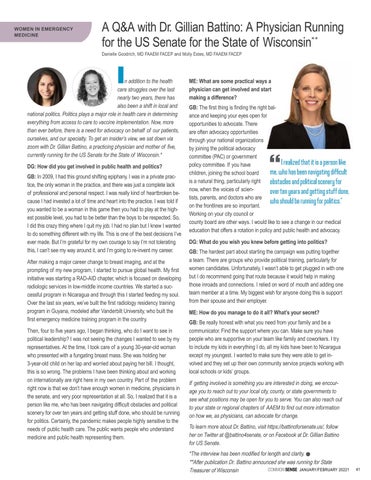WOMEN IN EMERGENCY MEDICINE
A Q&A with Dr. Gillian Battino: A Physician Running for the US Senate for the State of Wisconsin** Danielle Goodrich, MD FAAEM FACEP and Molly Estes, MD FAAEM FACEP
I
n addition to the health care struggles over the last nearly two years, there has also been a shift in local and national politics. Politics plays a major role in health care in determining everything from access to care to vaccine implementation. Now, more than ever before, there is a need for advocacy on behalf of our patients, ourselves, and our specialty. To get an insider’s view, we sat down via zoom with Dr. Gillian Battino, a practicing physician and mother of five, currently running for the US Senate for the State of Wisconsin.* DG: How did you get involved in public health and politics? GB: In 2009, I had this ground shifting epiphany. I was in a private practice, the only woman in the practice, and there was just a complete lack of professional and personal respect. I was really kind of heartbroken because I had invested a lot of time and heart into the practice. I was told if you wanted to be a woman in this game then you had to play at the highest possible level, you had to be better than the boys to be respected. So, I did this crazy thing where I quit my job. I had no plan but I knew I wanted to do something different with my life. This is one of the best decisions I’ve ever made. But I’m grateful for my own courage to say I’m not tolerating this, I can’t see my way around it, and I’m going to re-invent my career. After making a major career change to breast imaging, and at the prompting of my new program, I started to pursue global health. My first initiative was starting a RAD-AID chapter, which is focused on developing radiologic services in low-middle income countries. We started a successful program in Nicaragua and through this I started feeding my soul. Over the last six years, we’ve built the first radiology residency training program in Guyana, modeled after Vanderbilt University, who built the first emergency medicine training program in the country. Then, four to five years ago, I began thinking, who do I want to see in political leadership? I was not seeing the changes I wanted to see by my representatives. At the time, I took care of a young 30-year-old woman who presented with a fungating breast mass. She was holding her 3-year-old child on her lap and worried about paying her bill. I thought, this is so wrong. The problems I have been thinking about and working on internationally are right here in my own country. Part of the problem right now is that we don’t have enough women in medicine, physicians in the senate, and very poor representation at all. So, I realized that it is a person like me, who has been navigating difficult obstacles and political scenery for over ten years and getting stuff done, who should be running for politics. Certainly, the pandemic makes people highly sensitive to the needs of public health care. The public wants people who understand medicine and public health representing them.
ME: What are some practical ways a physician can get involved and start making a difference? GB: The first thing is finding the right balance and keeping your eyes open for opportunities to advocate. There are often advocacy opportunities through your national organizations by joining the political advocacy committee (PAC) or government I realized that it is a person like policy committee. If you have me, who has been navigating difficult children, joining the school board is a natural thing, particularly right obstacles and political scenery for now, when the voices of scienover ten years and getting stuff done, tists, parents, and doctors who are who should be running for politics.” on the frontlines are so important. Working on your city council or county board are other ways. I would like to see a change in our medical education that offers a rotation in policy and public health and advocacy. DG: What do you wish you knew before getting into politics? GB: The hardest part about starting the campaign was putting together a team. There are groups who provide political training, particularly for women candidates. Unfortunately, I wasn’t able to get plugged in with one but I do recommend going that route because it would help in making those inroads and connections. I relied on word of mouth and adding one team member at a time. My biggest wish for anyone doing this is support from their spouse and their employer. ME: How do you manage to do it all? What’s your secret? GB: Be really honest with what you need from your family and be a communicator. Find the support where you can. Make sure you have people who are supportive on your team like family and coworkers. I try to include my kids in everything I do, all my kids have been to Nicaragua except my youngest. I wanted to make sure they were able to get involved and they set up their own community service projects working with local schools or kids’ groups. If getting involved is something you are interested in doing, we encourage you to reach out to your local city, county, or state governments to see what positions may be open for you to serve. You can also reach out to your state or regional chapters of AAEM to find out more information on how we, as physicians, can advocate for change. To learn more about Dr. Battino, visit https://battinoforsenate.us/, follow her on Twitter at @battino4senate, or on Facebook at Dr. Gillian Battino for US Senate. *The interview has been modified for length and clarity. **After publication Dr. Battino announced she was running for State COMMON SENSE JANUARY/FEBRUARY 20221 Treasurer of Wisconsin
41
